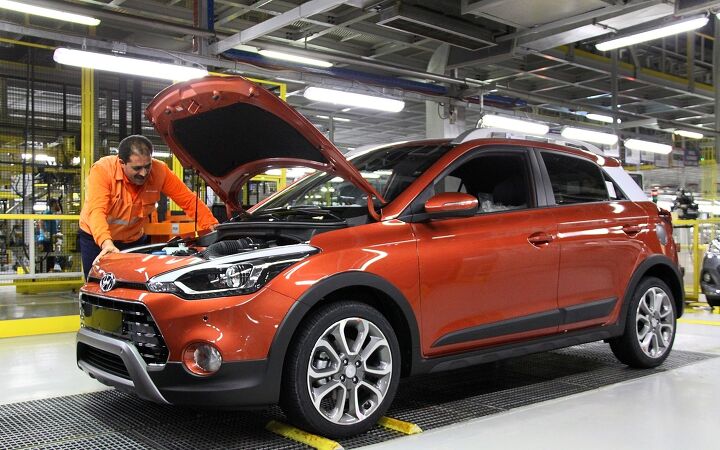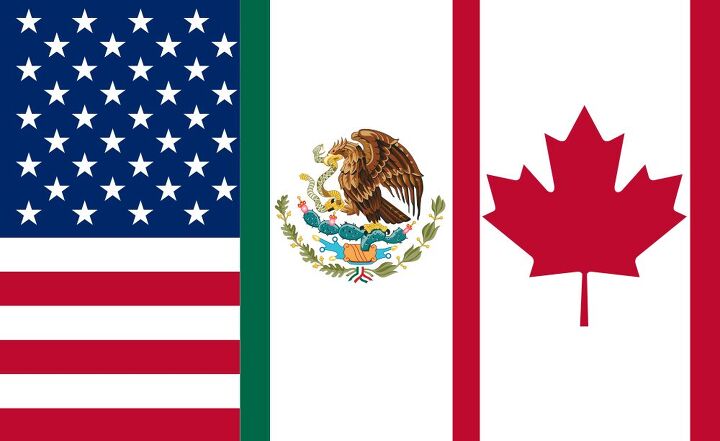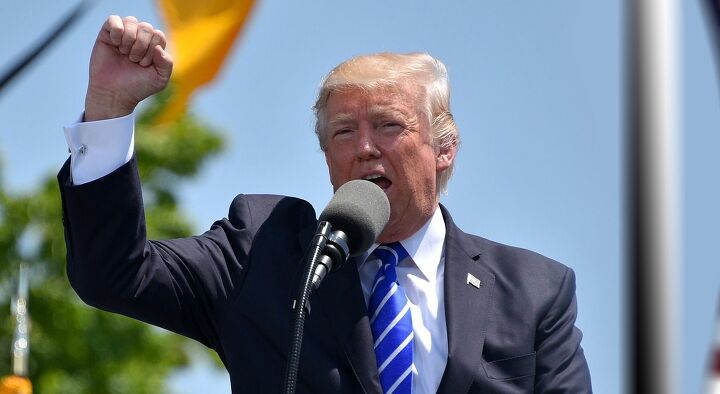#UnitedStates
NAFTA No More: U.S. Reaches Deal With Mexico, Puts Pressure on Canada [Updated]
President Donald Trump announced a trade “understanding” with Mexico on Monday — not to be confused with an official deal — that would lead to an overhaul of the North American Free Trade Agreement. Trump made the announcement from the Oval Office, with Mexican President Enrique Pena Nieto listening in by speakerphone.
While it’s still too early to show up in a Lockheed S-3 Viking and tell the world “mission accomplished,” the announcement is the most overt example of progress on NAFTA we’ve seen. Interesting, considering it seemed as if Trump was openly calling for its death during the meeting.
Earlier in the day, Mexican officials said trade talks with the U.S. had concluded, adding that an announcement could come later in the day. The White House confirmed the reports an hour later on its government website, with Donald Trump stating there was a “big deal looking good with Mexico” via twitter.
Apparently, Everyone Negotiating NAFTA Is a Child
If you’re anything like this author, you’ve probably abandoned discussing the North American Free Trade Agreement in your personal life. That’s not because it stopped being important, but rather due to the fact that none of the three countries involved seem capable of making any sort of progress.
Presently, the United States and Mexico are focusing on rules associated with automotive production. However, after two days of non-stop negotiation, Mexican Economy Minister Ildefonso Guajardo said the two sides haven’t resolved their differences on the pending issues. Now Mexico says it won’t consider further negotiations until Canada agrees to a deal.
Here’s where things get remarkably shitty. Canada has already explained that it’s waiting for the U.S. and Mexico to strike a deal of their own. “If they can resolve their differences on [automotive trade], then I think we can move ahead and have the three of us talk about some of the other issues that affect all of us,” David MacNaughton, Canada’s ambassador to the U.S, said in an interview earlier this month.
Trade War Watch: Turkey Readies 120 Percent Tariff On American Cars
In Joseph Conrad’s Heart of Darkness, Kurtz has an epiphany regarding himself, imperial conquest, and war as a whole, crying “The horror! The horror!” in his last moments of life. His experiences took him from a well-meaning businessman to a megalomaniacal warlord, only able to realize the full scope of his own corruption upon his death. Trade wars contain significantly less drama than real ones, but there is never a shortage of egotistical individuals falling down a rabbit hole of madness.
This week, a decree signed by Turkish President Recep Tayyip Erdogan raised the tariff on U.S. cars to 120 percent. While this doesn’t qualify as truly horrific, it certainly could head in that direction if things continue to escalate.
Three's Company, Too? Canada Returning to NAFTA Dance As U.S. and Mexico Approach Auto Deal
Canada says it could rejoin the NAFTA discussion, just as the United States and Mexico approach an agreement on automobiles. The two nations engaged in bilateral negotiations a little less than a month ago, seemingly making positive headway on a trade deal.
With President-elect Andrés Manuel López Obrador assuming office in December, it’s in the United States’ best interest to close a deal as soon as possible. It’s assumed the man, frequently referred to as “AMLO,” will make sweeping changes to the Mexican government. However, he also promises to join forces with several smaller parties from both the right and left to create a coalition aimed at rooting out corruption. The resulting level of uncertainty has many fearing difficult Mexican policy changes and trade negotiations in the future, effectively forcing a restart of NAFTA talks.
According to David MacNaughton, Canada’s ambassador to the U.S., the duo are close to finalizing a deal on automotive manufacturing. If so, the Northern nation is prepared to rejoin negotiations.
Britain's Auto Industry Foresees Doom Without EU Deal Before Hard Brexit
Mike Hawes, chief executive of the Society of Motor Manufacturers and Traders (SMMT), Britain’s main industry group, claims automakers were becoming increasingly concerned with the nation’s departure from the European Union. Prime Minister Theresa May wants a solution that would allow Britain to maintain strong trade ties with the EU while allowing her country to maintain autonomy, but hasn’t found much success.
U.S. President Donald Trump claims a deal with the United Kingdom is absolutely possible, saying the relationship between the two countries is “the highest level of special” late last month. But he also noted that the EU would complicated matters if Britain adhered to its trade laws after Brexit, which is just eight months away.
The European Union doesn’t seem to want to let Britain go, and is nudging the country to stick to its rules by not venturing out to make its own trade arrangements. Critics say this effectively makes the island nation a “vassal state” to the EU, completely defeating the point of Brexit. However, many are fearful that leaving the union and ignoring its mandates could have negative repercussions in the long term — especially in regard to finance and trade.
BMW Raising Prices on American-made SUVs in China, Willing to Absorb Some Tariff Costs
BMW says it will hike the price of two utility vehicles in China to cope with the additional cost of tariffs on U.S. car imports in the world’s biggest vehicle market. The models are the X5 and X6, both manufactured in South Carolina.
This news comes after China increased import duties on all automobiles from the United States to 40 percent earlier this month. China had previously said it would reduce its already high vehicle tariffs across the board as a sign of good faith — which it did, while simultaneously slapping new punitive tariffs on the U.S. Meanwhile, President Donald Trump has postponed prospective automotive tariffs while negotiations take place with Europe.
If you needed proof that a trade war is on and were wondering how automakers would handle it, look no further. BMW says it will have to raise the models’ Chinese MSRP by 4 percent to 7 percent. It’s a relatively modest increase considering how utterly massive the new import fees are, which indicates a willingness from the automaker to absorb some of the associated costs just to remain in the market. It’s something BMW is not alone in doing, and there could be a valuable lesson to be learned from that.
Trump Puts Hold on New Auto Tariffs; Trade Negotiations Commence With Europe
President Donald Trump agreed on Wednesday to refrain from imposing car tariffs while the United States launches negotiations to cut other trade barriers with the European Union. After a meeting at the White House, Trump and European Commission President Jean-Claude Juncker agreed to begin talks that would also seek to resolve U.S. tariffs on steel and aluminum, as well as retaliatory duties from Europe.
It’s the first lull we’ve seen in the trade war in a while. Meanwhile, Chinese trade relations remain as bitter as ever.
Trade War Watch: As Commerce Secretary Ponders Auto Tariffs During D.C. Hearing, Automakers Call Out the Troops
As the United States considers imposing new tariffs of up to 25 percent on imported automobiles and parts, the industry has rallied together to stand against the proposal. Manufacturers already made individual cases for themselves and are now dropping very bleak-sounding industry projections on the U.S. Commerce Department in the hopes of changing the administration’s mind.
However, President Donald Trump continues to promote the imposition of tariffs to force a sort of economic justice. For years, China’s protectionist policies regarding automobiles forced American manufacturers to build inside its borders and partner with Chinese firms for years. That’s something Trump claims could be a national security risk. China also recently upped its tax on American-made autos to 40 percent, shortly after promising to lower them. Meanwhile, Europe still holds a consistently higher tariffs on imported cars than the U.S., except for light trucks.
Commerce Secretary Wilbur Ross seems aware that China may have gamed the system in its favor, but appears less convinced that it’s a matter of national security. On Thursday, during a hearing on the probe into the industry, he said it was “too early” to say what the United States would do. Meanwhile, auto groups continue to make their terrifying case. (There’s also quite a bit of rolling PR in downtown D.C. today, as you’ll see below.)
Should Police Have the Ability to Track and Disable Self-driving Vehicles?
Autonomous vehicles have created an endless series of unanswerable questions. As the technology continues to advance, decisions on how best to implement it have not. We’ve yet to discern who is liable in the event of an accident, how insurance rules would change, if they can coexist effectively with traditional automobiles, how they will impact vehicle ownership in the long term, and the infrastructure necessary to ensure they’ll function as intended.
There’s also a myriad of security concerns involving everything from the very real prospect of vehicle hacking to automakers selling the personal information of drivers. Both of those topics are about to come to a head as automakers continue shifting toward connected vehicles.
In March, the U.S. Transportation Department met with auto industry leaders, consumer advocacy groups, labor unions, and others in an attempt to navigate the minefield that is autonomous integration. The department previously hosted similar roundtable discussions in December after releasing the new federal guidance for automated driving systems, called “ A Vision for Safety 2.0.” That guidance freed up automakers and tech firms to test self-driving vehicles with fewer regulatory hurdles to cope with.
However, the December report seemed to focus mainly on how little everyone outside the industry understands the new technology.
Trade War Watch: Mazda Joins Toyota in Condemning U.S. Tariff Proposals
Automakers are not thrilled with the White House’s current interest in automotive tariffs. With factories scattered across the globe, no major manufacturer would go untouched by the proposed increases in import duties or the retaliatory tariffs foreign governments may issue in response.
There’s a lot to lose from a financial perspective. According to a recent analysis from Evercore ISI, Fiat Chrysler would take an annual hit of $866 million if the United States placed a 25-percent import tariff on cars. Considering that other automakers stand to lose at least that much, it’s unsurprising they’ve begun raising their corporate voices over the matter.
Granted, the FCA example is a worst-case scenario for that particular brand, but even a lesser tariff would see a profit loss of hundreds of millions. For an automaker like Mazda, the loss would be far worse.
Report Claims Self-driving Cars Will Make So Much Money, No One Will Care About Employment Losses
There’s been plenty of discussion about how autonomous vehicles will effectively annihilate the trucking and taxi industries. We’ve certainly discussed it — in addition to concerns that self-driving vehicles may not reduce pollution and traffic congestion as promised.
Fear not, claims a recent report sponsored by Securing America’s Future Energy. The problem of self-driving cars displacing huge numbers workers is apparently overblown when compared to the economic impact as a whole. According to the study — “America’s Workforce and the Self-Driving Future” — the loss in employment opportunities should be offset by the potential advantages in safety, cheaper transportation, mobility, air quality, and individual productivity.
The report says that by 2050, AVs will contribute between $3 and $6 trillion in cumulative consumer and societal benefits to the U.S. economy. While it’s not clear how much of that will go into the pockets of people who’ve lost their jobs, it sure sounds great in theory.
But is this really the future of autonomous transportation? And who are these wizards of analysis who tell us the future looks so damn bright?
Bet You Forgot Today Was the NAFTA Deadline
If you forgot today was the deadline for finalizing North American Free Trade negotiations, don’t worry, so did practically everyone else. In fact, the whole affair is starting to feel like that old car that’s been sitting in your friend’s yard for far too long. He keeps telling you he’s going to fix it up and make it better than new. “This is the summer,” he says. But you know he’s just going to keep mowing around it while it continues to rust and collect mice, so you’ve tried to push it out of your mind.
Like the restoration, the entire concept of a deadline for the trade deal is rather arbitrary at this point. NAFTA’s initial target date for an agreement between the three countries was March 31st, roughly one year after negotiations began. The May 17th deadline was claimed by U.S. Speaker of the House Paul Ryan, who said Congress had to be notified under the Trade Promotion Authority statute.
“We need to receive the notice of intent to sign soon in order to pass it this year,” explained Ryan’s office. “This is not a statutory deadline, but a timeline and calendar deadline.”
Basically, Congress wants to influence the president and NAFTA negotiators to conclude talks swiftly and reach an agreement before midterm elections. But Mexican officials warned everyone not to get their hopes up. “The possibility of having the entire negotiation done by Thursday isn’t easy, we don’t think it will happen by Thursday,” said Mexican Economy Minister Ildefonso Guajardo earlier this week.
Premium is the New Regular: Automakers Want to Kill 87 Octane
The automotive industry wants to make 95 octane gasoline the new normal for the United States and it has taken its case to Washington. On Friday, Dan Nicholson, General Motors’ vice president of global propulsion systems, told the House Energy and Commerce Committee’s environment subcommittee that switching to 95 octane would align the U.S. with Europe and is one of the most affordable ways to boost fuel economy and lower greenhouse emissions.
Affordable for automakers, that is. Because there is no reason to think your local gas station will suddenly do you a solid and price 95 octane lower just because 87 is gone.
Team Trump Eases Demands on NAFTA's Regional Auto Content
The United States is softening the contentious automotive content requirement mandates pushed by the Trump administration as part of NAFTA renegotiation talks. While the demand is only one of many asks coming from the U.S., both Canada and Mexico said forcing 85 percent of a vehicle’s overall content to be sourced from the three countries (in order to side-step tariffs) was a nonstarter. Over the past year, the issue became a major sticking point in the trade talks — hindering progress and possibly dooming them to failure.
While Trump’s intent was to bolster domestic employment by incentivizing North American parts suppliers, automakers expressed concerns and noted it was often difficult to reach the current threshold of 62.5 percent.
The United States has now proposed applying the new content requirement only to major components (like a vehicle’s powertrain) while leaving fasteners (nuts, bolts, etc.) alone. As an automobile is made up of tens of thousands of individual parts, deciding what should and should not be counted will make a big difference. Still, some manufacturers are likely to have difficulty meeting the proposed content requirement on critical engine components.
Trump is Talking Tariffs Again, Takes Aim at European Cars
President Donald Trump amplified his earlier threat of a global trade war this weekend by suggesting he would impose a tax on European cars if the EU countered his proposed steel and aluminum tariffs. On Thursday, Trump called for a 25 precent import tariff for steel and a 10 percent fee on aluminum in the hopes it would bolster those industries domestically. Europe responded by threatening a tax on imported bourbon, blue jeans, and American motorcycles. Apple pie and baseball were not mentioned, but you get the idea.
European Union officials clearly wanted to send a message to the president to back down. Instead, he came back even harder in a tweet from Saturday. “If the E.U. wants to further increase their already massive tariffs and barriers on U.S. companies doing business there, we will simply apply a Tax on their Cars which freely pour into the U.S.,” he wrote. “They make it impossible for our cars (and more) to sell there. Big trade imbalance!”



![NAFTA No More: U.S. Reaches Deal With Mexico, Puts Pressure on Canada [Updated]](https://cdn-fastly.thetruthaboutcars.com/media/2022/06/30/8798011/nafta-no-more-u-s-reaches-deal-with-mexico-puts-pressure-on-canada-updated.jpg?size=720x845&nocrop=1)


























Recent Comments